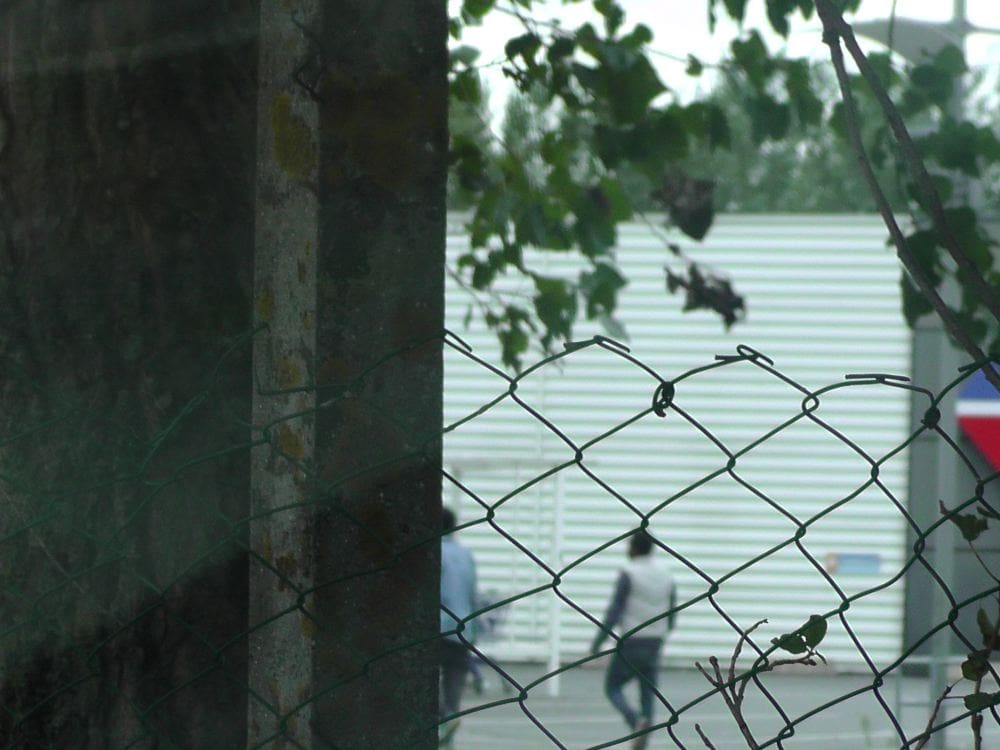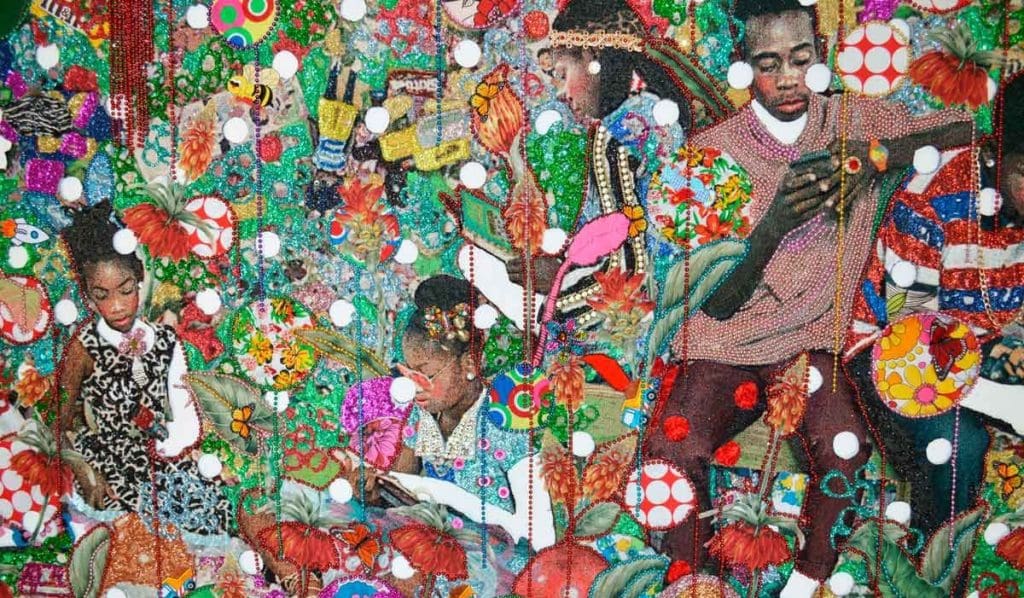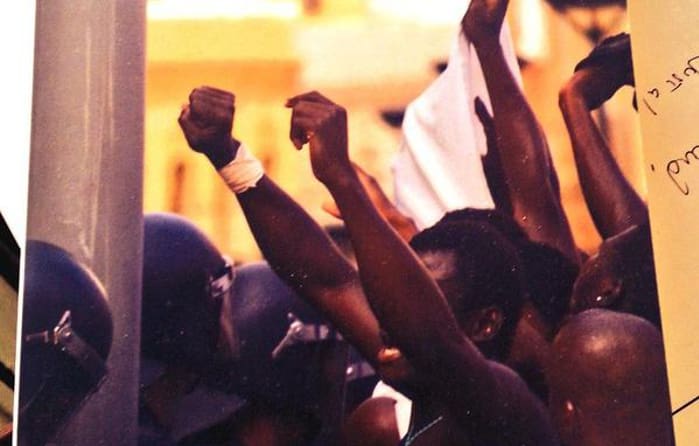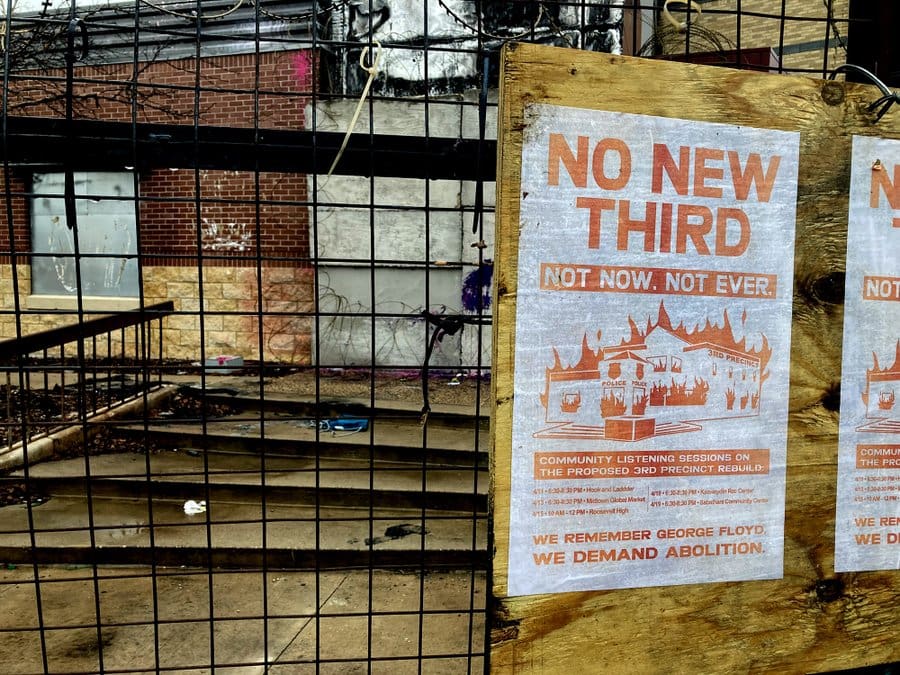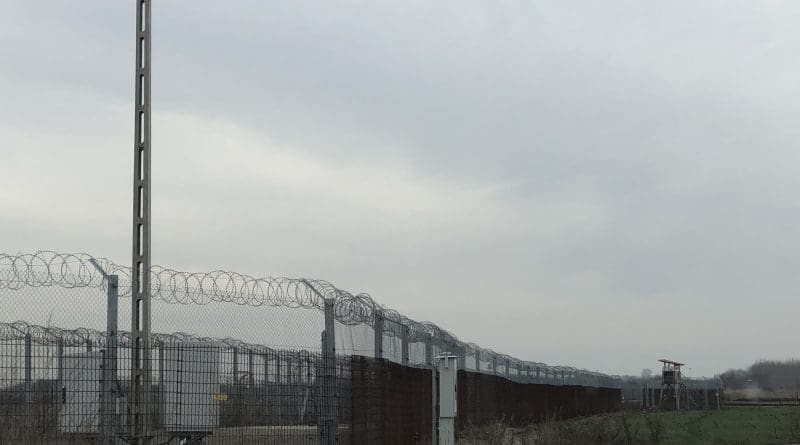Calais and the Unwelcoming EU
from the blog of the International Women’s Space Berlin
20 September 2015 (original post)
In 1989 I traveled from Calais to Dover. Whilst on the ferry, I requested a visa. The officer didn’t trust me and as we approached the UK, I was sent to a room, where a dog and a few officers sniffed around me and my luggage. For hours, maybe five, I answered all their racist questions. Eventually they let me in, and I lived in Britain for longer than the standard six months’ visa they had given me. In the end I was deported and banned from entering the UK for the next five years.
This summer, after more than two decades, I returned to Calais. I wanted to see how far the EU had developed their unwelcoming attitudes towards foreigners, specially non-whites, non-Europeans, like me. I went to what is called ‘the Jungle,’ where thousands of refugees, mainly from Eritrea, Syria, Sudan, Ethiopia, and Afghanistan, survive crammed into small, wrecked tents, built on dunes, close to one of the roads that access the Eurotunnel.
To reach the industrial area where the Jungle is located and to find its main entrance, you have to transit a middle-class residential area with quiet streets, comfortable new houses, bright new cars parked in front, with white families watering their gardens, pulling up dead and unproductive plants. This provided the perfect embodiment of a bourgeois life style. I felt lost.
We kept going and soon a group of black men cut out from the landscape. They were also on their way to the Jungle. After you leave the idyllic territory of the fortunate inhabitants of Calais, you enter a main road, heading to a highway, but instead of going straight over a bridge, you turn left on an unpaved street and there you are, in the middle of nowhere.
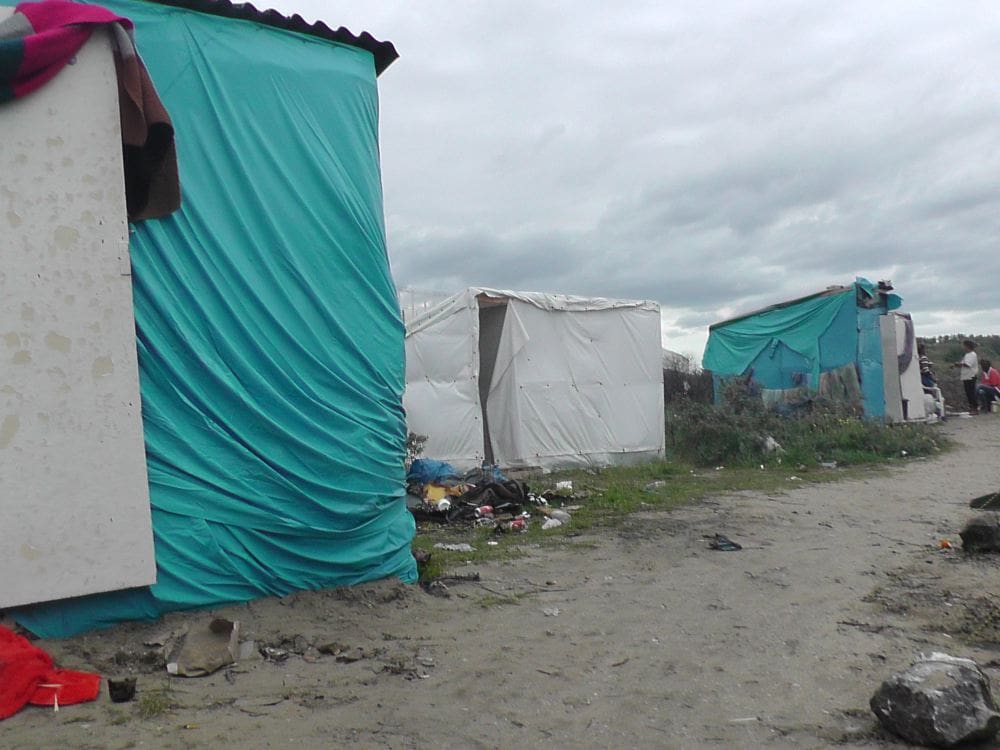
This unpaved road serves as the main street in the Jungle. If you only walk through that you might not believe there is more than a thousand refugees living in the area. But as soon as you climb through the dunes on your left side, you see the whole picture. Tents and more tents sprawled over the sandy area.
I began asking the few women I saw if there was a woman or a group of women with whom I could speak. They couldn’t understand English. They were from Eritrea and spoke Tigrinya, but they called a guy over, who told us in English: “There is nothing here, people don’t want to stay, we are only passing on our way to the UK.”
Regarding the women living there, he explained that there was an NGO at the end of the street where many women were being housed, but that we wouldn’t be able to go in as they don’t allow everyone inside their compound, whatever “everyone” means.
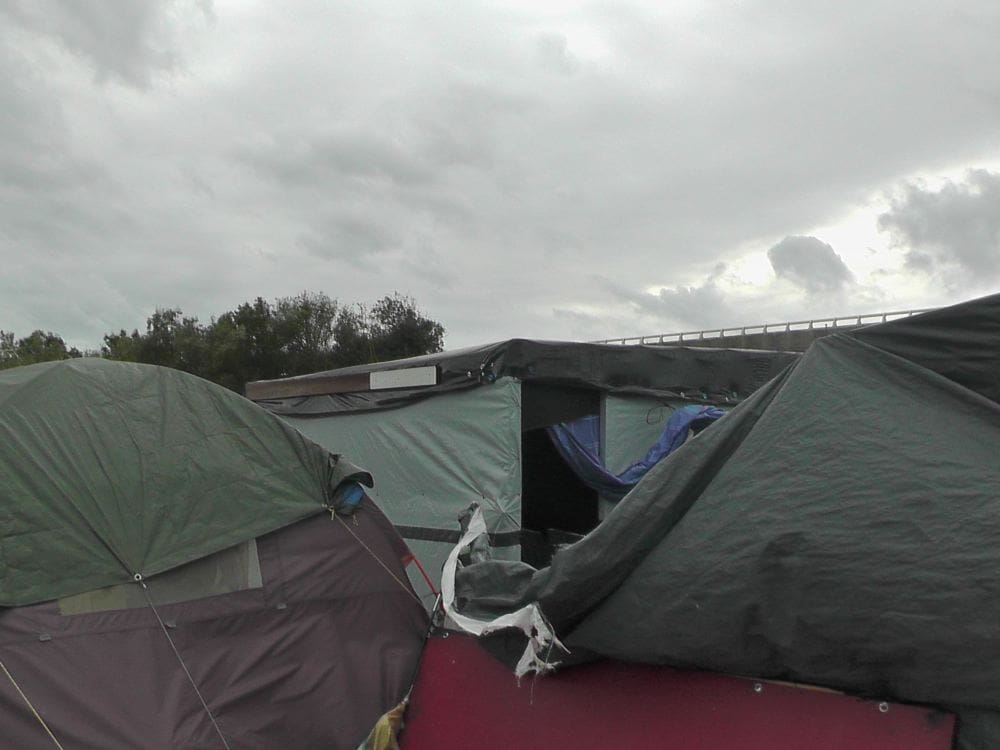
We tried anyway. Around a ten minutes’ walk from where we met the Eritreans, we found a fenced area. In front of it there were white people wearing t-shirts with the logo of the NGO guarding the gates. I explained I was coming from Germany, that I was part of a refugee and migrant women’s group and that I was interested in speaking to the women in order to understand how they are living and what they are looking for.
A young blond girl listened to me, looked at my International Women Space card and called her boss on the radio. The man in charge said, “No, she can’t come in.”
“Is there anyone I could speak with in order to understand what your NGO is doing here?” I asked.
The girl didn’t seem to understand. She looked a bit confused and told me I should write them an email, which I never did.
I thanked her and left in disbelief, with a feeling that I had just come across a prison inside a prison. It was not much of a surprise, though. They were doing what they do best: playing the white saviors’ game. They create the crisis, then they administer charity. ‘We are here because you destroyed our countries’ should be written in big letters at the entrance of the Jungle and translated in all languages. That could clarify the reasons why thousands of people are living in tents, sandwiched between a highway and an unpaved road, in a French border city like Calais.
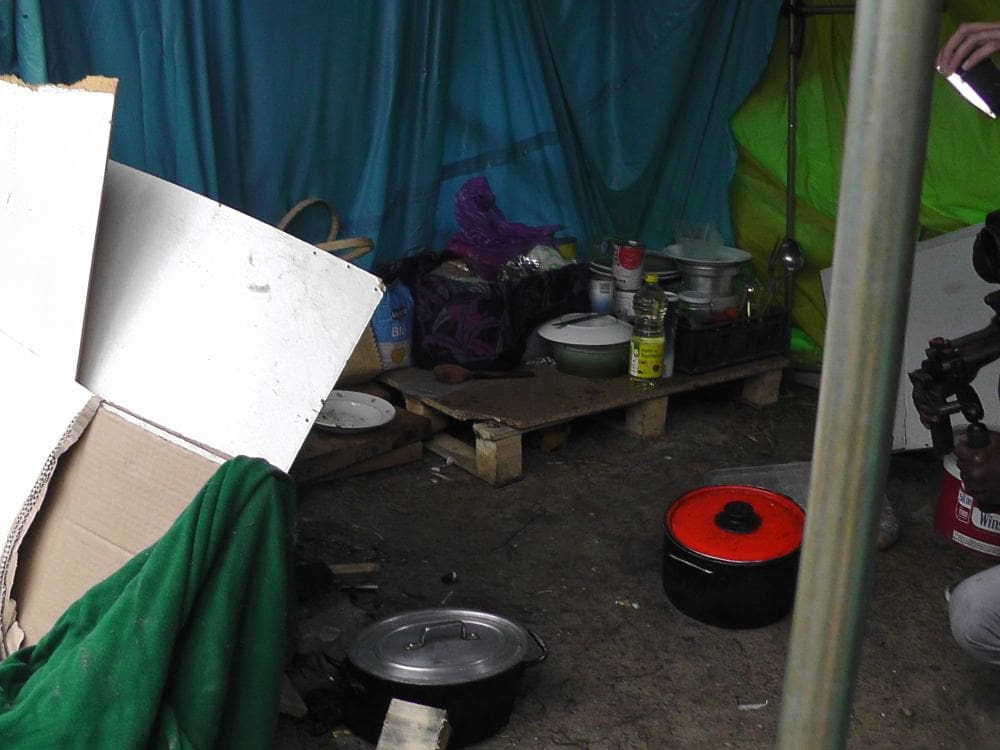
Outside the NGO’s controlled zone, we found another area where women were living. There we spent an afternoon together drinking coffee and communicating the best we could despite the lack of a common spoken language. With the help of some men who translated for us, we talked about the International Women Space in Berlin, what we do and the importance of organizing women’s spaces. I gave them our IWS card and invited them to join us in case they changed their minds about going to the UK and decided instead to come to Germany. The woman who was cooking lunch thanked me as she took the card and others approached to have one too.
Whilst the women were busy among themselves, two men started to draw a map on the sandy ground next to where I was sitting. They were planning the route for that night’s escape to Britain. The man drawing the map was an Ethiopian, a survivor of one of the many sunken boats in the Mediterranean. He has also survived eight months in a Libyan prison, from where he managed to escape only after giving the guards a couple of thousand dollars sent from home.
“That is how it works in Libya,” he said. He explained that if you enter Libya on your way here, the chances are that you will be jailed indefinitely, with hardly any food or water until you get enough money to pay for your freedom.
When he was done with his map, he took us to a bar, a big tent built in the Jungle, a meeting point for Ethiopians, Eritreans and Sudanese, mainly. The bar is comfortable with chairs and sofas positioned in a circle. To keep out the cold and rain, blankets cover the walls. It is colorful and the Ethiopian woman who runs it makes sure you feel welcomed.

She can’t speak any English, but she is so expressive that I started kidding myself that I understood every bit of what she was saying. Whenever she told a joke, I laughed along with the others. Maybe they were laughing at me. It didn’t matter. I was tripping by, trying to understand how when someone tells a joke, everybody laughs in such a situation.
She wanted me to understand her, though, and without me asking, W. began to translate what she was saying. She was explaining why she had organized the bar. She needed to collect two thousand dollars to send to her mother, who had sold everything in Ethiopia, to pay the jail guards in the prison in Libya where she was jailed for nine months. She said she was close to collecting the money she owed her mother.
I don’t know how, because during the two hours I was there, I didn’t see her charging anyone for the beers. She also didn’t charge for the soft drinks she gave to my partner and me.
I asked if in the Libyan prison women were jailed separately. They said no, everybody is jailed together and the sexual harassment is frequent. As the time passed, more people came in, some girls, some young and old men. It seemed that all of them had experienced Libyan prisons and for sure, many had survived a boat crossing the Mediterranean. There was a camaraderie coming from a shared and common past and the fact that everyone will go, sooner or later, to the UK.
I asked why not Germany. Some told me they have heard about the German refugee camps in the middle of nowhere, where people are left to wait in vain for permission to stay. They wanted to go to the UK because it is where they believe they can work and continue with their lives. They were not interested in money from the government. That was not the plan, but they wanted work, to have a home to later house their relatives. Some were married, with children, who had stayed at home because the journey was too dangerous. The walk, the prison, the boat, the Jungle—it was all too much for their children, they said. They wouldn’t survive.
W. was going to jump on a moving train that same night. I offered to take him and his friend by car to the railway line. He accepted because to walk there would take two and a half hours. He had done that before a couple of times and so had his friend. That’s why his leg was injured.That’s also why I have seen so many men with injured legs walking through The Jungle. According to both, every night around 300 refugees try to jump on the train, with no more than twenty succeeding.
As a Latin American woman, almost nothing I saw here was new for me—the extreme misery, the total lack of infrastructure, the absence of a realistic perspective, the sadness hidden behind a smile, and constant courtesy. I grew up seeing this in the poor areas of Brazil. What still shocks me, though, is to see how it happens in Europe. How bizarre it looks, how flagrantly and blatantly racism operates.
One hour’s walk from the Jungle, there is a Lidl supermarket, one of the biggest discount supermarkets in Europe. There security men keep a close eye on refugees inside. If they spot refugees sitting outside the shop, they will tell them to leave. No one cares if refugees were customers minutes ago and had spent some euros buying their goods. Local customers dissimulate as if they were deaf and blind. And everybody pretends not to have seen anything unusual. And perhaps it is not unusual; that is how refugees are supposed to be treated in Calais. It is a difficult reality to swallow because it only makes sense if you are able to dehumanize the other.
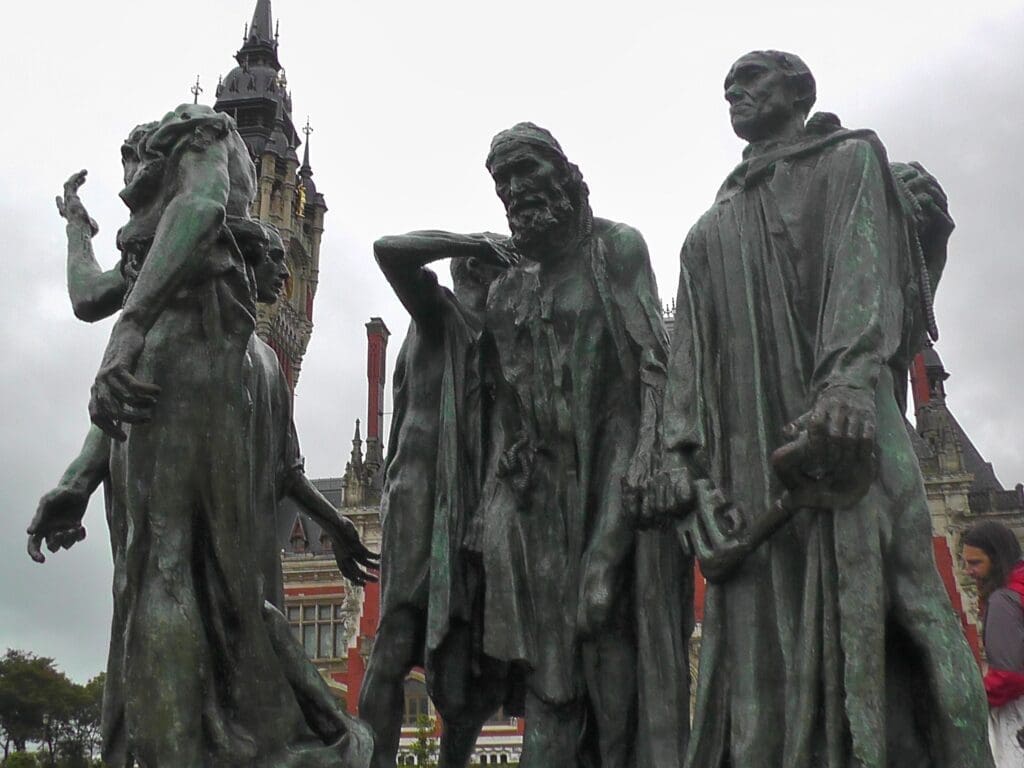
In the Port of Calais, ships sail every thirty minutes, carrying people back and forth to the UK. No refugees are allowed in. Some people camp around the harbor, which is located in the town center, midway between the Jungle and the railways. We sat one afternoon in one of the public parks around this area, close to where a huge sculpture of Rodin, Le Bourgeois de Calais, stands. The monument represents a heroic moment at the end of the 100 Years War (1337-1453), when Calais was under siege by the English and starvation was killing the city’s population.
At one point, the king of England Edward III offered to lift the siege if at least one of the city’s principal citizens would surrender. Six of these important citizens decided to surrender, even though they knew chances were that they would be beheaded. But off they went to save the people of Calais. They were spared in the end, and their courage, and perhaps humanity, is what the monument of Rodin stands for.
If the citizens of Calais still believe it is worth sacrificing in the name of the powerless, it is nowhere to be seen or felt. Many times I had an impression of being in a zombie town, with half-asleep people walking past, completely ignoring the present realities and the faith of the thousands of foreigners fleeing wars and misery.
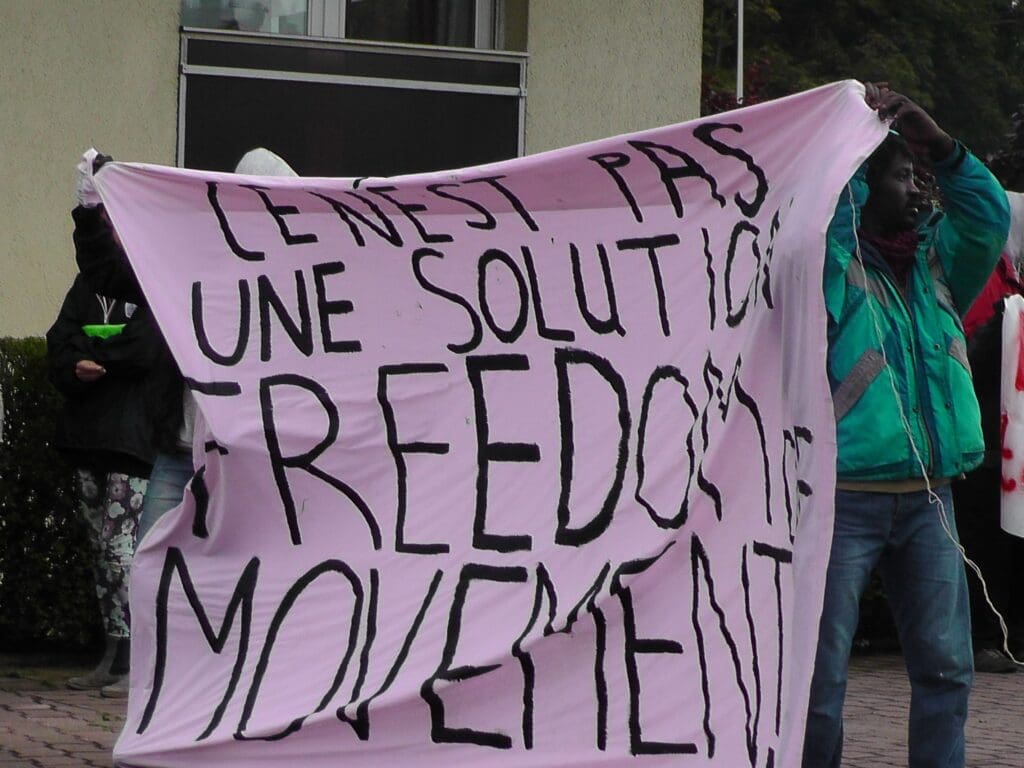
On 20 August, a few days after our arrival, Theresa May, the UK home secretary, and the French Interior Minister Bernard Cazeneuve met in Calais to sign one of those agreements to control what Europe calls a “migrant crisis.” The people in the Jungle are not migrants. They are refugees running from devastated areas, courtesy of the Western countries and their insatiable greed.
The afternoon before, we joined a group of refugees, and together we made some banners for the next day’s demonstration. I got some cardboard given by local European supporters and started asking the people what they wanted me to write on the placards. ‘We are not animals, we are humans’ was the sentence I heard the most. These words were said in different languages and translated by those who knew English. A few times I had to remind them we already had many cardboard posters with ‘We are not animals, we are humans’ written on them.
On the day of the demonstration, only a group of twenty refugees managed to walk the hour-and-a-half long stretch to the town center, where we stood blocks away from the mayoral house, which had been barricaded by the police.
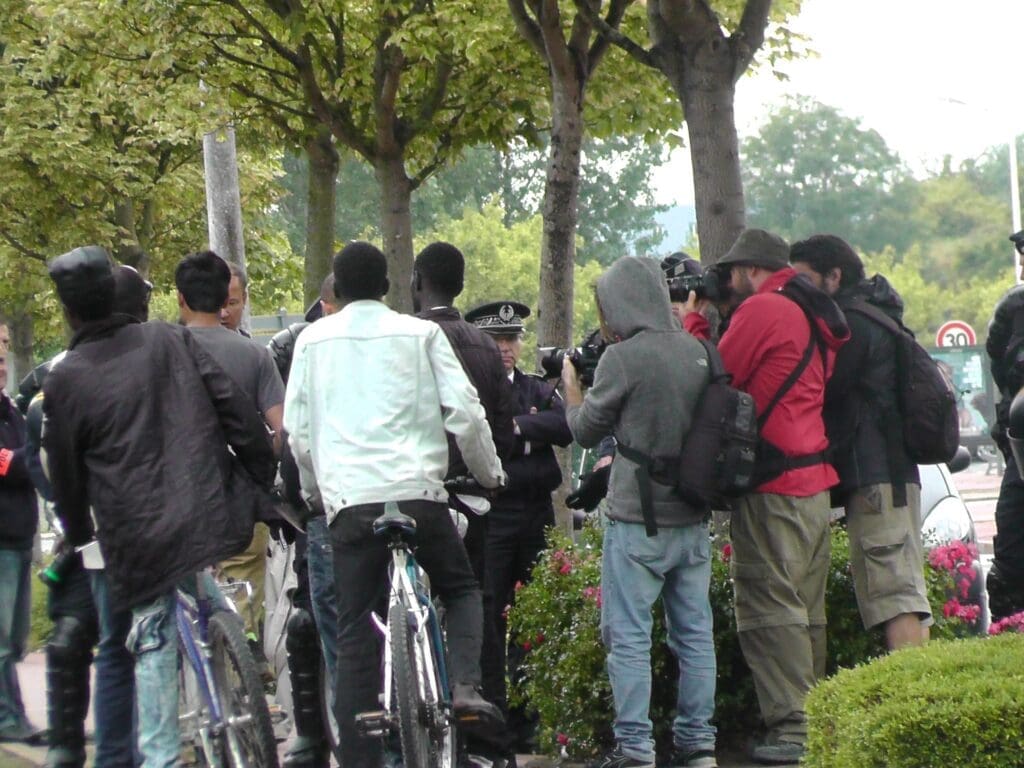
At our stationary demonstration, I spoke to a Calais resident, a man in his late 60s, who kept telling us how disgusted he was by not seeing more Calais residents joining the plea of the refugees for dignity and the right to stay or to move on to wherever they wished. For him these men and women living in the Jungle were the bravest people he had seen for a long time. They were real survivors, capable of peacefully enduring all that had been done to them by the Europeans since colonialism.
About his fellow Calais citizens he could only describe them as a cynical bunch who weep in front of their TVs when watching news of war and poverty abroad, but cannot cope with seeing these same victims in the reality of flesh and bone. There were many more people who tried to join this day’s protest, but were stopped by the police right outside the Jungle. As a result and out of frustration, in the afternoon a group of a hundred refugees blocked the road to the Eurotunnel again. They were attacked yet again with pepper spray and other forms of police violence.
It rained most of the eleven days we spent in Calais. It was always painful to imagine the night in the Jungle, of all the people thinking, feeling, alone or in small groups, trying to figure a way to transform their lives for the better. The words of W. and his friends, of the woman in the bar, and the many other brave men and women we came across the small alleys of The Jungle, consoled me. These are brave people who will not give up no matter how many pounds or euros are invested in fences, police forces or in European racist regimes. The refugees are slowly changing the world as we know it. The direction it will go will depend on the acceptance of Western countries that their system of exploitation, wars, and narco-imperialism is broken and doesn’t work. It is kaputt and charity alone is not the answer.
I still don’t know if W. and his friend made it to the UK that night, but I am sure if they didn’t, they will try again. And the words in the “Shaktar Donetsk” song from a 2001 Joe Strummer album keep coming to my mind:
Welcome to Britain, in the third Millennium
This is the diary of a Macedonian, Macedonian
He went to Britain in the back of a lorry
“Don’t worry, don’t worry, don’t hurry”
said the man with the plan.
He said, “If you really wanna go
You’ll get there in the end”
You really wanna go
Alive or dead my friend
Well, you can levitate you know
Long as the money’s good you’re in
Or if you really wanna go
You’ll get there in the end
He had the woolly scarf of Shaktar Donetsk
Nay, the banner of freedom wrung around his neck
Inherited from his father
One of the Ukraine exiles of Yugoslavia
He said, “You’ll get there in the end”
You really wanna go
Alive or dead my friend
Well, you can levitate you know
Long as the money’s good you’re in
Or if you really wanna go
You’ll get there in the end
Yeah, he got a little postcard
Yeah, everybody got a dream
Yeah, he always got it with him
Yeah, oh, it’s of a nineteen twenty-five
Red telephone box with Wembley in the background
Them twin tower vandal eye
Will he find a two bar heater
Waitin’ for him in two rooms
Above the cut rate telephone anywhere place
He got off the train in Shadwell
Disappeared without a trace
He said, “You’ll get there in the end”
If you really wanna go
Alive or dead my friend
Well, you can levitate you know
Long as the money’s good you’re in
Or if you really wanna go
You’ll get there in the end
Oiling the grinding city underside
Treating each flake of rust all over Humberside
You know a blocked generator could cut power
To the city system
Well, you’ll get there in the end
Alive or dead my friend
You’ll get there in the end
Alive or dead my friend
If you really wanna go
You’ll get there in the end
If you really wanna go
Alive or dead my friend
All images: International Women’s Space

